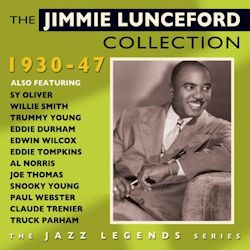CD1
1. In Dat Morning
2. Sweet Rhythm
3. Breakfast Ball
4. Swingin' Uptown
5. Sophisticated Lady
6. Miss Otis Regrets
7. Star Dust
8. Black and Tan Fantasy
9. Dream of You
10. Solitude
11. Rain
12. Since My Best Gal Turned Me Down
13. Jealous
14. Shake Your Head from Side to Side
15. Runnin' Wild
16. Four or Five Times
Jimmie Lunceford & His Orchestra
17. Bird of Paradise
18. Rhapsody Junior
19. Avalon
20. Hittin' the Bottle
21. My Blue Heaven
22. Muddy Water
23. Raggin' the Scale
24. Annie Laurie
25. Frisco Fog
CD2
1. Pigeon Walk
2. Baby, Won't You Please Come Home
3. Blue Blazes
4. Sassin' the Boss
5. Wham Re-Bop-Boom-Bam
6. Swingin' on C
7. Monotony in Four Flats
8. Minnie the Moocher Is Dead
9. State and Tioga Stomp
10. I Had a Premonition
11. Blue Afterglow
12. I'm a Heck of a Guy
13. The Morning After
14. Battle Axe
15. I'm Walking Through Heaven with You
16. Okay for Baby
17. Hi Spook
18. Yard Dog Mazurka
19. Impromptu
20. Keep Smilin, Keep Laughin, Be Happy
21. Strictly Instrumental
22. I'm Gonna See My Baby
23. This Is My Confession to You
24. I Need a Lift
25. Water Faucet
Jimmie Lunceford Orchestra
Recorded 1930-47 [76:20 + 74:28]
The Lunceford band has always been considered one of the finest of all New York outfits of the 1930s, and yet how many great tracks do we remember? If one
asks the question of Ellington or Basie the answers will fall like rain, but Lunceford? Similarly how many soloists in the band could even a confirmed
admirer of the Big Bands of the time put a name to? Maybe Willie Smith, at a pinch, and later on Trummy Young or Sy Oliver: Snooky Young if you head
towards the 1940s. But the dilemma remains. This was an often great band with strengths more in a corporate sound than in any great soloistic flair. It
tended to be recreationist in its performances rather than innovative. Every time I come back to the Lunceford band I expect to be surprised anew by it but
I always leave listening sessions feeling strongly it should have been – well, if not better, then at least more consistently exciting.
But a survey such as this twofer allows the listener to travel from the rather crude sounds of the June 1930 band – the Chicksaw Syncopators (and they live
down to the name) – to the sides made for Majestic and Decca in the mid to later 40s. The radical change in sound and style came soon, certainly by March
1934 by which time sectional discipline is tight (often the same players are still in place such as little-remembered trombonist Henry Wells) and the
arrangements, often courtesy of Sy Oliver, excellent. There’s now a taut, punchy power, often two-beat, and a more relaxed approach to rhythm. Solos are
uniformly good but more colouristic than soloistic in the main. The only non-conformist was Smith whose often dazzlingly angular arabesques tickle the ear
every time. They took by-now standard repertoire, such as Ellington’s Black and Tan Fantasy, and paid homage by retaining the Bubby Miley-inspired
plunger work but without quite putting an independent stamp on it. Yet these Decca sides also turned up a fair amount of anodyne material, of which Since My Best Gal Turned Me Down is one example. Period vocals also intrude and trumpeter Eddie Tompkins, for one, is never going to be
immortalised as a premier league singer. Another cul-de-sac followed was the fondness for swinging the Light Classics and folkloric material: Annie Laurie is only redeemed by a fighting trombone solo from the gutsy Trummy Young.
I think people will still appreciate the Dandridge Sisters whose Minnie the Moocher is Dead allows a fine quotient of humour to intrude but the
Lang-Worth sessions of 1940 do feel more than somewhat as if the band was going through the motions. The material was mediocre, the performances dutiful.
Frankly, the band sounds bored. Pianist Eddie Wilcox brought some arranger vitality to those sides a little later, and he plays fine Stride on his own Impromptu. But the writing was on the wall as Lunceford, seemingly as parsimonious as Duke, refused Willie Smith’s pay demands and the alto player
left. He was replaced by Omer Simeon, ex-Jelly Roll Morton and a very different player, much more impressive on clarinet than doubling on alto. The full
disbandment came in 1949.
There are useful notes and – praise be – full track details with dates and label release numbers. The sound quality is sometimes a little variable but
never less than pretty reasonable. The Lunceford band offers an interesting case study and this twofer allows one to take in everything necessary to form
one’s own judgement as to its strengths and failings in the tough consumer world of the 1930s and 40s.
Jonathan Woolf
